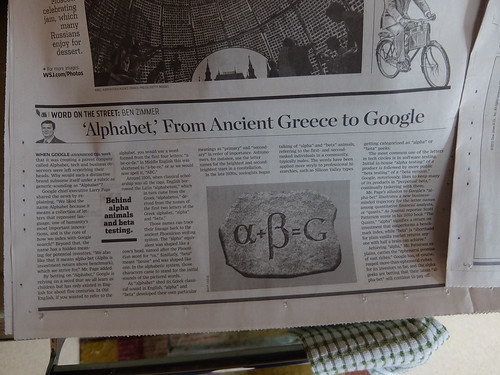I read the Wall Street Journal (WSJ) this morning (page C4), seeing spin applied: Alpha has market meaning, similar to the one in Geekdom.
An "alpha geek" -- not to be confused with anything only male -- tends to be Bullish in the sense of upbeat (Bears tend to be more bullying), and Bet is like betting i.e. taking risks. "Bet on us to stay Alpha" is therefore the "secret" message. Fine, that's clever.
I think another spin would be along the lines of how people admit to a veritable "alphabet soup" in some namespaces, meaning the number of abbreviations is going to seem daunting to an outsider, may seem out of control to even an insider.
Quakers play that game, with their FWCC, FGC, FCNL, AFSC, NPYM and so on and on, a veritable "alphabet soup" of Friendly entities. When introducing Quakerism to newcomers, that bewildering array of abbreviations is referred to as "alphabet soup" (no, not Quaker oats).
The US.gov plays similar games and actually Indra's Net is infinite for all intents and purposes, but thankfully not all at once. One tunes in as necessary, to get the work done.
The inevitable cartoon, if Google itself kept buying and owning, would be to call it Gobble, which only dilutes its Search Engine sharpness with the image of some creature with a big appetite.
"Alphabet soup" in contrast, contains the possibility of staying undiluted and dense with nutritious sense (or at least islands thereof).
So making the parent sound soupy, while keeping the successful flagship meaning what it means, is all good planning, at least at first glance. Seems apropos.
Back to Wall Street, investors like to know what they're buying and don't like it when hidden losses get covered by what's really the driving core. Using profits to cover losses, all internally, makes it hard for investors to see what's happening (that's sometimes intentional).
The call for transparency is not just from voters but shareholders as well and new activists are demanding nominating powers over the board of directors (also in the WSJ today).
Corporate bylaws are not some ultimate shield against democratization and many of the more successful companies are that way because of their decentralized "everyone responsible" sense of self-governance.
That's another reason it's good to split up. I think Deke was telling me that, my neighbor, one of the top Tweeters in Portland, in terms of followers. True, our City of Roses is no nation's capital, but it does have that cosmopolitan gateway status accorded cities of world class. So hats off to Deke.
An "alphabet soup" is otherwise known as a namespace. Whereas Google (a childhood word for huge number) connotes a kind of brute force infinitude, a search engine plowing through giant mounds to get at what's critical, Alphabet connotes permutations starting with only a small set, like DNA.
Infinitude stems from a few core rules, an alphabet, creating the chaos, the welter, the many words, which Google then explores. Such is the Alpha and Omega of at least one company's business model, no doubt more than one.
Speaking of Omega, the Unicode tables are sensitive to differences in meaning (but maybe not to a great enough degree in some cases?). The Ohms Omega and the Greek letter Omega have two separate code points.
In principle, the distinction provides a freedom for these two to get further apart, even in appearance, although I'm not saying that's a prediction, simply what "different code points" allows.
That dive into Unicode may seem a non sequitur but think again: when it comes to permutations and abbreviations, nothing's to stop us from intermixing more alphabets than just one.
Plus Unicode extends to cover beyond what most people call "alphabets" i.e. this is ideogram country, but mathematical symbols as well.
So lets expect our alphabet soups to get more interesting and experimental. That doesn't mean they'll all be tasty or catch on. Some people prefer specialty soups, which may be just as wholesome if not more so.
Speaking of Wall Street Journal, here's another example of it's applying spin this past April in:
A Test Drive of the Death-Trap Car Designed by Buckminster Fuller by Dan Neil.
Here's some counter-spin from an Archdaily some years earlier: Video: Norman Foster Recreates Buckminster Fuller's Dymaxion Car by Kelly Minner.
For more on the topic of Fuller's weird car and its misadventures, see Trevor Blake's recent narrative account. Also see Poor Slob Bucky for more analysis of LAWCAP's anti-Fuller PR. To say these squares feel threatened by an advancing Grunch is somewhat a truism in this namespace.

